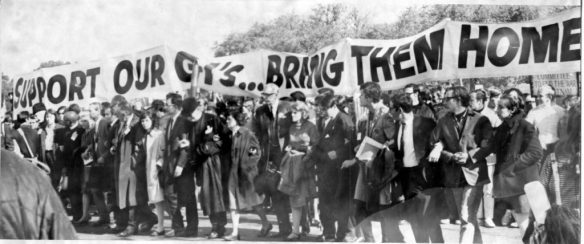
New Orleans I was surprised recently when I saw a note mentioning the 50th anniversary of the March on the Pentagon on October 21, 1967 in Washington, D.C., one of the seminal events of the anti-war protests against the Vietnam War. We’re seeing a lot of these golden jubilee events these days. It was only a couple of years ago we were commemorating critical events in the civil rights movement, and now the clock has advanced from there to the Vietnam War, short by the clock of modern wars like our longstanding, never ending engagements in Afghanistan and to some degree, Iraq, but still as bloody as many, body to body.
I finished reading a book recently that I had missed somehow when it was published in 2003, by historian Michael Foley called Confronting the War Machine: Draft Resistance During the Vietnam War. I had discovered when some quote popped up as people relived those hard old days, where he either said or was quoting someone else saying that there was an argument that “draft resisters were the freedom riders of the anti-war movement.” That notion grabbed my attention and found me scurrying to read the book.
Interestingly, Foley concentrated on the anti-war activities around Boston during those days, especially between 1967-1969 or so, and even more determinedly focused on two groups that defined the efforts there during those days, the Boston Draft Resistance Group and the New England Resistance. As it happens, I living in Massachusetts in college at the time and was a foot soldier at both the Spring Mobilization in March 1967 in New York City and in the March on the Pentagon in 1967 and either later that fall or early in 1968, it’s impossible to remember now, went to Boston one weekend to be trained as a draft counselor by the BDRG. Not long afterwards I dropped out of college and headed to New Orleans to try to organize draft counseling there in March 1968.
The book brings back memories of a generation, particularly young men, at a crossroads, not common today, but because of the mandatory draft administered by the Selective Service system, everyone of us was forced to make life-and-death decisions about our futures in the face of the war. Foley’s book is excellent on the inequities of the draft as well as the pressure that both anti-war activities and the more limited resistance put on the White House to end the war.
His position in the book on the earlier question of individual and collective action is more nuanced. He poses the proposition as a paradox and a continuing head scratcher, saying that some,
“argue that draft resisters were the antiwar movement’s equivalent to the civil rights movement’s Freedom Riders and lunch-counter sit-in participants; today, Americans regard those dissenters as heroes while they view draft resisters as selfish, cowardly, and traitorous.”
Perhaps, but it is easy to understand the contradiction, and, like so many things in American public life, it is firmly rooted in differences in race and class. Going through several draft physicals while I was was classified as 1-A from 19 to 26 years old in the period before there was a lottery, the draft physical lineup was strikingly lower income and working class, black in New Orleans and black and brown in Springfield, Massachusetts.
Part of what attracted me to the BDRG was not just the skills they offered in understanding the draft system and its byzantine practice in order to competently advise people facing these life choices adequately, but what Foley cites as its philosophical “adherence to community organizing.” It’s also why I have often described my time in New Orleans during 1968 trying to organize something like a draft counseling operation in the communities as my wake-up call to the difficulties of organizing and the weight of constant and powerful failure that hovers over such valiant work. Where I wanted to work in communities didn’t work out well at a time the South was still overwhelmingly supportive of the Vietnam War, yet I was inundated by requests from white college kids trying to figure out a good way out of the draft, more in the manner of an escape hatch than any resistance.
I didn’t give up on organizing, but it was a life lesson that taught me that counseling was in high demand, but alone solved nothing unless integrated in a deeper program of organizing for power.
Nonetheless, it is a small comfort to read that the cumulative work of so many, of which I was a small, small part, had value in stopping the war then, partially because of the horror and power of the draft, compared to now when so many ignore that we are even involved in a war, so far away from their lives and the choices they have to make about how to live them.